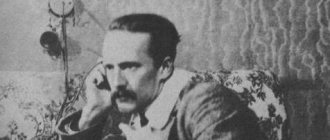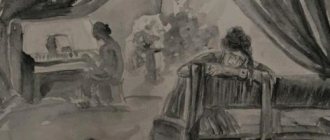History of writing
The story “Case History” was written in 1936, and was first published in the Krokodil magazine in 1937-1938. The author conceived this work after visiting the hospital where Mikhail Zoshchenko ended up due to a serious illness . He was surprised by the cold and heartless attitude of medical workers towards patients, while caring for each of the patients was declared. Work on this short story took literally several days, but certain difficulties arose with its printing.
Publishers did not want to risk publishing such a sharp satirical story, which in 1937 could cost them not only their jobs, but also their lives or being sent to camps for ten years. Only after the approval of the “Case History” by high authorities, Zoshchenko went with all the necessary papers to the Krokodil magazine, and subsequently this work appeared in his general collection.
This book was popular among readers; the problem described by the author was extremely close to many people’s hearts, because almost every day they encountered such rudeness and callous attitude from government agencies.
Start
Zoshchenko’s story “Case History” is written in the first person.
The hero, whose name is Peter, is admitted to the hospital. He has typhoid fever. The patient believes that the hospital was bad. The story goes on to explain why he formed this opinion and what the patient faces upon arrival at the hospital.
Already in the emergency room, the hero sees the following notice posted in a prominent place:
Issuance of corpses from 3 to 4
Indignant, he makes a remark to the paramedic, to which the paramedic, surprised by the remarks of the patient, who is literally steaming from his mouth from internal heat, replies that, they say, be silent, since you are sick, otherwise it is not a fact that you will recover.
A quarrel would have broken out, if not for the high temperature and poor health of the patient. The next thing to note in the summary of Zoshchenko’s “Case History” is the appearance of a nurse who invites the hero to a “washing station.” And again he shuddered: that’s not what they called him: “I’m not a horse to be washed. They would say more sublimely - “bath”. To which he was again advised not to delve into the subtleties of language, otherwise, the hour is uneven, the patient will not live to see recovery.
Story genre
The story “Case History” is written in the realistic genre . This is a subtle satire on the medical institutions and medical care system existing at that time in the Soviet Union. On paper, high authorities reported caring for the person, but in reality, each patient was considered a cog in the system, so one should not be surprised at the disdainful and sometimes boorish attitude towards patients on the part of the medical staff.
Undoubtedly, in his work, Mikhail Zoshchenko exaggerated the misfortunes of the main character, showing him as a picky and sometimes boring person. However, all his demands are completely objective, emphasizing the indifference of doctors and nurses to patients in hospitals. Zoshchenko, when creating this story, refused to describe typical heroes, choosing ordinary people with whom every reader can associate himself as the main characters.
The humor in this work, as well as its narrative, is similar to the great stories of Mark Twain. The situation the narrator finds himself in is both comical and tragic. Every Soviet person guessed in such a character his own adventures in hospitals and clinics. It is not surprising that this work was relevant not only in the thirties of the last century, but also for many decades, when patients in medical institutions were faced with such an attitude towards themselves.
The author ridiculed the existing order in society, while simultaneously asserting the existing shortcomings in the Soviet system.
About the heroes of the story
In a brief analysis of Zoshchenko’s “Case History,” it is enough to note that the plot of the work can be very concisely stated as follows: “The hero really did not like the hospital in which he ended up. Therefore, in future he tries not to go there.”
It is quite obvious that such a presentation conveys to the reader almost nothing of the content of the story. After all, the point is not why the hero came to this conclusion, but what pushed him to it.
As you read the story, you get the impression that Peter, the hero of the story “Case History,” is not a simple person, he is a demanding esthete. He does not like the rudeness of ordinary life, including a simple hospital. Perhaps, like the character of Zoshchenko’s early story “The Sorrows of Young Werther,” he, in his dreams
a wonderful life is pictured. Nice, understanding people. Respect for the individual. And gentleness of morals. And love for loved ones. And the absence of abuse and rudeness.
And everywhere there is eternal, ineradicable rudeness and callousness towards one’s neighbor. And a person should get used to it, but somehow he doesn’t get used to it. Especially when on the wall of an institution that, by definition, is designed to take care of your health, there is a terrible sign about the issuance of corpses. And on the faces of the main characters of Zoshchenko’s “Case History” - the paramedic and the nurse - the patient can also clearly read the amazement that the patient is not only alive, but also talking.
Through bitter jokes and humor with a black tint, the writer dreams of the subtlety and delicacy of human relationships, expressed in the same “The Sorrows of Young Werther”: “Let us finally respect each other, comrades!”
And this is the evolution of the writer’s views: if young Werther back in 1914 was ready to wait and believe in benevolence in any sphere of human relations - because he was young, and his soul was also young, then Peter in 1936 comes to the hopeless the conclusion that it is still better not to go to the hospital (read: it is better not to turn to people for help and not to count on their kindness).
Main characters
The main character of the story is an ordinary Soviet citizen who is admitted to the hospital with a high fever and typhoid fever. From his words it becomes clear that he is an educated person who has the courage to discuss and criticize all the shortcomings he has seen in medical institutions.
The main characters of the story are:
- the narrator is an ordinary Soviet person;
- emergency room paramedic;
- washroom nurse;
- head physician of the hospital.
Traditionally, for his stories, Zoshchenko describes only a few characters, who are practically not given any characteristics. This is done so that the reader himself can think of certain qualities and character traits of the heroes of this work. At the same time, many in this description guessed all the doctors and paramedics they encounter in their hospitals and clinics.
The main character of “Case History” strives for inner harmony and outer beauty. This is an idealist who dreams that in Soviet life words do not diverge from deeds. He does not groundlessly criticize the shortcomings in the hospital, suggesting possible ways to correct them. However, neither the paramedic, nor the doctors, nor the management of the medical institution are interested in such comments, since they are indifferent and dismissive towards all patients.
Literature. 8th grade (part 2) Medical history
| Disease history Frankly speaking, I prefer to be sick at home. Of course, there are no words, in the hospital, perhaps, it is brighter and more cultured. And the calorie content of their food may be more adequate. But, as they say, even straw can be eaten at home. And they brought me to the hospital with typhoid fever. My family thought this would alleviate my incredible suffering. But this alone did not achieve their goal, since I came across some special hospital where I didn’t like everything. After all, they just brought the patient, they write him down in the book, and suddenly he reads a poster on the wall: “Issuing corpses from 3 to 4.” I don’t know about other patients, but I literally swayed on my feet when I read this proclamation. The main thing is that I have a high temperature, and in general life may be barely glimmering in my body, maybe it is hanging by a thread - and suddenly I have to read such words. I told the man who was recording me: - Why, I say, comrade paramedic, are you posting such vulgar signs? Still, I say, patients have no interest in reading this. The paramedic, or whatever his name is - a doctor, was surprised that I told him so, and said: “Look: he’s sick, and he can barely walk, and there’s almost steam coming out of his mouth from the fever, and he also, he says, brings self-criticism towards everything.” If, he says, you get better, which is unlikely, then criticize, otherwise we will really hand you over in three to four years in the form of what is written here, then you will know. I wanted to clash with this doctor, but since I had a high temperature, 39 and 8, I did not argue with him. I just told him: - Just wait, medical tube, I’ll get better, so you’ll answer me for your impudence. Is it possible, I say, for sick people to listen to such speeches? This, I say, weakens their strength morally. The paramedic was surprised that the seriously ill patient was talking to him so freely and immediately hushed up the conversation. And then my sister jumped up. “Let’s go,” the patient says, to the washing station. But these words also made me shudder. “It would be better, I say, to call it not a washing station, but a bath.” This, I say, is more beautiful and elevates the patient. And I, I say, am not a horse to be washed. Nurse says: “Even though he’s sick, he says he also notices all sorts of subtleties.” He probably says you won’t recover because you’re poking your nose into everything. Then she took me into the bathroom and told me to undress. And so I began to undress and suddenly I saw that a head was already sticking out above the water in the bathtub. And suddenly I see that it looks like an old woman is sitting in the bathtub, probably one of the sick. I tell my sister: “Where have you dogs taken me—to the ladies’ bath?” Here, I say, someone is already swimming. - Yes, this is one sick old woman sitting here. Don't pay any attention to her. She has a high fever and is not responding to anything. So you can undress without embarrassment. In the meantime, we will take the old woman out of the bath and fill you with fresh water. I speak: “The old woman doesn’t react, but maybe I still react.” And I say, it’s definitely unpleasant to see what’s floating in your bathtub. Suddenly the doctor comes again. “This is the first time I’ve seen such a fastidious patient,” he says. And he, the impudent one, doesn’t like it, and it’s not good for him. The dying old woman bathes, and then he expresses his claim. But she may have a temperature of about forty, and she doesn’t take anything into account and sees everything as if through a sieve. And, in any case, your appearance will not keep her in this world for an extra five minutes. No, he says, I prefer it when patients come to us in an unconscious state. At least then everything is to their taste, they are happy with everything and do not enter into scientific disputes with us. Here the old woman bathing speaks: “Take me out of the water,” he says, “or, he says, I’ll come out myself and spoil you all here.” Then they took care of the old woman and told me to undress. And while I was undressing, they immediately poured hot water in and ordered me to sit there. And, knowing my character, they no longer began to argue with me and tried to agree with me in everything. Only after bathing did they give me huge underwear that was not for my height. I thought that out of spite they deliberately gave me such a set that didn’t measure up, but then I saw that this was a normal occurrence for them. Their small patients, as a rule, wore large shirts, and the large ones wore small ones. And even my kit turned out to be better than others. On my shirt, the hospital stamp was on the sleeve and did not spoil the overall appearance, but on other patients the stamps were on the back and on the chest, and this morally humiliated human dignity. But since my temperature was rising more and more, I did not argue about these subjects. And they put me in a small ward where there were about thirty different types of patients. And some, apparently, were seriously ill. And some, on the contrary, got better. Some whistled. Others played pawns. Still others wandered around the wards and in the warehouses, reading what was written above the headboard. I tell my sister: “Maybe I ended up in a mental hospital, so you say so.” I say, I go to hospitals every year and have never seen anything like this. There is silence and order everywhere, and it’s like a market. She says: “Perhaps you will be ordered to be put in a separate room and a guard will be assigned to you so that he will drive away flies and fleas from you?” I screamed for the chief doctor to come, but this same paramedic suddenly came instead. And I was in a weakened state. And at the sight of him, I completely lost my consciousness. I just woke up, probably three days later, I think. My sister tells me: “Well,” he says, “you really have a two-stranded body.” You, he says, have passed all the tests. And even we accidentally put you near an open window, and then you suddenly began to get better. And now, he says, if you do not become infected from your neighboring patients, then, he says, you can be sincerely congratulated on your recovery. However, my body did not succumb to illness anymore, and only just before leaving I fell ill with a childhood disease - whooping cough. Sister says: “You probably caught the infection from the neighboring outbuilding.” We have a children's department there. And you probably carelessly ate from a device on which a child with whooping cough ate. This is why you got sick. In general, soon the body took its toll, and I began to get better again. But when it came to being discharged, then, as they say, I suffered too much and fell ill again, this time with a nervous disease. Because of my nervousness, small pimples appeared on my skin, like a rash. And the doctor said: “Stop being nervous, and this will go away with time.” And I was nervous simply because they didn’t discharge me. Either they forgot, then they didn’t have something, then someone didn’t come and it was impossible to note. Then, finally, they started a movement of the wives of patients, and the entire staff was knocked off their feet. Paramedic says: “We are so overcrowded that we simply cannot keep up with the discharge of patients. In addition, you only have eight days to spare, and then you are raising hell. But here some people who have recovered are not discharged for three weeks, and they endure it. But soon they discharged me, and I returned home. Spouse says: “You know, Petya, a week ago we thought that you had gone to the afterlife, because a notice came from the hospital that said: “Upon receiving this, urgently come for the body of your husband.” I was healthy, and it was only because of my nervousness that I started getting pimples. In general, for some reason I felt unpleasant about this incident, and I wanted to run to the hospital to argue with someone there, but when I remembered what happens there, you know, I didn’t go. And now I’m sick at home. Thinking about what we read 1. Try to write a short story on any topic from school life, using the humor of Zoshchenko or Teffi. 2. Prepare a review of the story by Zoshchenko or Teffi (your choice). “We read, we think, we argue...” for 8th grade, write stories for his graphic plots “Crime Novel”, “Bacillus of Laughter”, “Poet”, “Comic” (your choice). Creative task 1. Try to write a short story on any topic from school life, using the humor of Zoshchenko or Teffi. 2. Prepare a review of the story by Zoshchenko or Teffi (your choice). 3. Look at the drawings of the Danish artist H. Bidstrup in the book “Read, Think, Argue...” for 8th grade, write stories for his graphic plots “Crime Novel”, “Bacillus of Laughter”, “Poet”, “Comic” (optional) . Explain the words and phrases, introduce them into your colloquial speech: dominate, shy character, devotedly, spineless, glimmer of consciousness, indignation, get sick. LISTENING TO AN ACTOR'S READING A sad story - the hero of the story got sick, ended up in a hospital, where everything is strange and sad... 1. What do you think is more sad or funny in the story? 3. Why is the hero of the story “Case History” indignant? What intonations do his questions require—indignation, bewilderment? How do they sound when read by an actor? 5. How does Anatoly Vologdin read questions addressed to medical workers, and how does the actor reproduce their answers? Why are health workers unhappy with patients? 6. What conclusion did our hero come to? What do you think prevails in the story - humor or satire?
|
Summary
The main character, on whose behalf the story is told, fell ill with typhoid fever and was admitted to the hospital . The tests begin already in the emergency room, where he sees an inscription about the schedule for the release of corpses. The narrator argues with the paramedic, arguing that such information stands do not need to be placed in a visible place. This does not add strength to patients who become nervous and mentally depressed.
The next test awaited in the washroom. The narrator began to assure the nurse that such a name was more suitable for a collective farm. After all, it is there that cows and other animals are bathed and cleaned in the washing room. As soon as he was brought to this room, the main character notices that he is being offered to undress while some old woman is washing herself in the bath. After a short argument, the elderly patient is finally taken away, which allows the narrator to wash himself and dress in hospital clothes, which turn out to be several sizes too large.
The narrator, finding himself in a ward for 30 people, was again dissatisfied with the treatment and asked to call the attending physician. Instead, an orderly came, but the narrator no longer had the strength to argue, he lost consciousness from a high fever, and woke up only a few days later. According to the nurse, for several days he was between life and death, he had a fever and fever, but his young body won, and the narrator woke up and began to recover.
At the end, before discharge, he learns that his wife was sent a funeral by mistake, mistaking her for another patient. This is where the torment in the hospital ends, and the narrator, albeit untreated with a small rash, is discharged, vowing to never go to such medical institutions again.
Style and language
About Zoshchenko also that the author’s style is easily recognizable, the texts are easy to read, as they say, “in one breath.” Their distinctive feature is brevity, simplicity of presentation, and the vividness of the characters depicted in the works.
A characteristic feature of skaz speech is the mixing of clericalisms with literary and colloquial language expressions. This “cocktail” helps create a central image of the hero - after all, the speech is in the first person.
However, humorous heroes often cause not only laughter, but also an ironic smile, and sometimes even disgust. After all, the most recognizable character in Zoshchenko’s stories is an ordinary man in the street, a tradesman, a “little man.” In many ways, this is the case, for example, with Peter, the hero of Zoshchenko’s story “A Case History.” He does not possess the outstanding qualities of the new Soviet man, quite the contrary - he is often greedy, calculating to the point of pettiness, cunning and naive at the same time. At the same time, he is proud and respects his high spiritual personality.
In the article we provided a review of Zoshchenko’s “Case History”, a summary and analysis of the story.
Analysis and artistic diversity
The main problem of this story is the formal attitude towards people of Soviet institutions. Moreover, this kind of thing is encountered not only in hospitals and clinics, but also in almost all spheres of life. The main character tries to resist the system, but is persecuted by doctors and medical staff. Ultimately, he submits, completely abandoning the possible fight for justice. According to the author, formalism still wins in Soviet life, and the fight against the existing way of life is simply impossible.
Issues raised in the work:
- formal attitude towards patients;
- the general deception and lies of the Soviet system;
- comparison of government agencies and the entire country with a prison.
The main character of “Case History,” Zoshchenko, belongs to the category of those unlucky people who remain guilty in every situation. He expresses dissatisfaction with the indifferent attitude of doctors and paramedics, but in the hospital he is considered an impudent and picky patient. The nurse even suggests that such curious people do not live long, therefore, with a high degree of probability, the patient will not be able to recover from the disease.
“Case History” consists of several consecutive episodes that describe all the torments of the main character in the hospital. Each of these episodes is funny and makes the reader laugh, being a means of satirically describing such a callous attitude towards every patient and person. The author, making the speech of doctors illiterate, ridicules doctors who not only did not treat, but even harmed their patients.
Noteworthy is a small passage in this story where all patients are given hospital pajamas. Thus, the author makes a generalization that the Soviet system is a general prison camp. Zoshchenko compares the medical facility to a prison, in which prisoners are also given uniforms with a special mark on the back or chest. All this humiliates human dignity, turning all people into a submissive gray mass.
Treatment
The hero came for a wash and began to undress. Suddenly he sees his head already sticking out of the water in the bathroom. An old woman is sitting, probably one of the local patients. The patient is outraged again: “Yes, this is a ladies’ bath! Where have you taken me? To which the same nurse answers him that there is no need to be embarrassed, the patient is this old woman with a high fever, and she does not react to anything. “But I’m reacting! - the hero exclaims with all his strength. “I hate to see this!”
The doctor who comes in calls the patient impudent. And then an old woman, supposedly not reacting to anything, speaks from the water:
“Take me out of the water,” he says, “or,” he says, “I’ll come out myself and spoil you all here.”
After this, the patient finally takes a bath. They give him large, oversized underwear. The hero took a closer look: and it’s the custom in this hospital that small patients are put on the shirts of giants, and the corpulent ones are wearing the opposite. And sick leave marks are everywhere. A seal on the chest of a shirt or on the back is morally degrading to human dignity, a fastidious patient believes. And he has it on his sleeve. Well, in the end he resigns himself, this is not the worst option.









